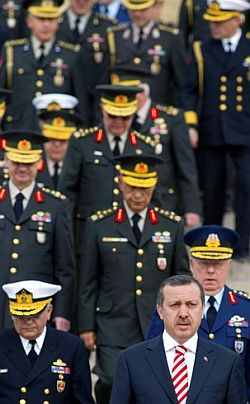With the professionalisation of journalism in the early 20th century came a more detached style of reporting. In effect, a deal was struck between advertisers, publishers and journalists, says New York University’s Jay Rosen. Journalists agreed not to alienate anyone so that advertisers could aim their messages at everyone. That way the publishers got a broader market and the journalists got steady jobs but gave up their voices. Objectivity is “a grand bargain between all the different players”, says Mr Rosen. When radio and television emerged, America’s private broadcasters embraced impartiality in their news reporting to maximise their appeal to audiences and advertisers and avoid trouble with regulators.
These days different countries have different preferences. In Europe overt partisanship in newspapers is widespread and state-run television channels often have partisan allegiances: Italy’s three state channels are each aligned with specific parties, for example. The political independence of the BBC in Britain is unusual, and is in any case contested by critics who complain that it is too left-leaning. In India 81 of the 500 satellite-TV channels that have sprung up in the past 20 years are news channels, most of them catering to specific political, religious, regional, linguistic or ethnic groups. Only a few take an objective, pan-Indian approach, says Daya Thussu of the University of Westminster.
If impartiality is already the exception rather than the rule, the internet is now eroding it further. In America it undermines local news monopolies by reducing advertising revenue and providing access to a wide range of alternative sources, thus undoing Mr Rosen’s grand bargain. In Britain and other countries where news broadcasters are required to be impartial, at least in theory, the convergence of television and the web makes such rules seem outdated. Mark Thompson, the director-general of the BBC, said at a seminar last December that he thought the case for polemical, opinionated news channels was “persuasive”, though the BBC’s own news coverage would remain impartial. The internet has also compressed the news cycle, with headlines delivered instantly by smartphone or Twitter, creating a demand for immediate analysis and opinion.
Moreover, the internet makes it easier than ever to find and synthesise different views, says Krishna Bharat, the creator of Google News. The idea for the site occurred to him in the months after the attacks of September 11th 2001, when he became frustrated by the inefficiency of visiting lots of different websites to get a broader picture of the news. When news comes from multiple sources, a mix of strong opinions becomes more desirable. “It’s time to embrace the fact that certain news sources have a point of view, and that’s why they have the following they do,” says Mr Bharat. “I think there’s a place for all of them.” By undermining many of the traditional arguments for objectivity, the internet may thus cause a wider “Foxification” of news and a return to the more opinionated and partisan media landscape of the 18th and early 19th centuries. “Almost every country that has an open society is going to have some kind of opinion television programming,” says Mr Shine.
This does not mean that all news organisations should take overtly political positions. Mr Rosen is just one of many media watchers who think it is time to release journalists from the straitjacket of pretending that they do not have opinions—what he calls the “view from nowhere”. Journalists signal their impartiality by quoting people on opposing sides of an argument and avoid drawing conclusions, even when the facts are clear. “There have been times in the past when CNN has been criticised for being neutral—not only non-partisan, but not really having positions,” says Mr Whitaker. But lately, he says, “we have been stronger in taking a point of view when we think it is supported by our reporting and by facts.”
One way forward, suggests Mr Rosen, is to abandon the ideology of viewlessness and accept that journalists have a range of views; to be open about them while holding the reporters to a basic standard of accuracy, fairness and intellectual honesty; and to use transparency, rather than objectivity, as the new foundation on which to build trust with the audience. He cites the memorable phrase coined by David Weinberger, a technology commentator, that “transparency is the new objectivity”. In part, this involves journalists providing information about themselves. For example, on AllThingsD, a technology-news site owned by Dow Jones, all the journalists provide an “ethics statement” with information about their shareholdings, financial relationships and, in some cases, their personal life (two journalists are married to employees at large technology companies). “People are more likely to trust you if they know where you are coming from,” says Mr Rosen.
Transparency also means linking to sources and data, something the web makes easy. Bloggers have long used the technique to back up their views. Ezra Klein, a blogger at the Washington Post, has suggested that news organisations should publish full transcripts of interviews online. WikiLeaks’ Julian Assange, a fan of radical transparency if ever there was one, makes a similar argument. “You can’t publish a paper on physics without the full experimental data and results. That should be the standard in journalism,” he said last year. Mr Weinberger has observed on his blog that transparency prospers in a linked medium: “Objectivity is a trust mechanism you rely on when your medium can’t do links. Now our medium can.”

 Fifty years ago, when a populist prime minister tangled with the Turkish military, he ended up on the gallows, the mandate of three election victories little consolation. This time around, the rivalry climaxed with most of Turkey’s military command resigning simultaneously, its leader complaining of powerlessness and bad press.
Fifty years ago, when a populist prime minister tangled with the Turkish military, he ended up on the gallows, the mandate of three election victories little consolation. This time around, the rivalry climaxed with most of Turkey’s military command resigning simultaneously, its leader complaining of powerlessness and bad press.